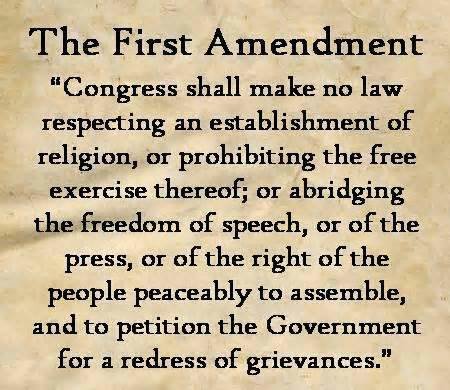
Thursday marked the 228th anniversary of the signing of the U.S. Constitution which took place in 1787. To commemorate the occasion, USA Today released a poll showing the percentage of the population who can name their First Amendment rights. And the numbers aren’t good.
Of the five rights covered under the First Amendment, thirty-three percent could not name even one of them.
What’s worse is only 57% were able to name freedom of speech, clearly the most popular of the bunch.
Nineteen percent named freedom of religion.
Tied at 10% was both freedom of the press and the right to assemble. The prize for most overlooked goes to the right to petition, garnering only two percent. [from truthrevolt.org 9-18-15 and USAToday.com 9-17-15]
The capacity to memorize the Constitution is not the big issue here. The big issue is whether people understand their rights — or even care that they have rights, at all.
It’s distressing that only 33% of people can name even one right guaranteed by the First Amendment. Shouldn’t “freedom of speech” or freedom of the press come immediately to everyone’s mind?
But even more important: Do people understand what freedom of speech actually means?
For example, does freedom of speech mean the right to speak your mind at any place, any time, including with government money, or without the consent of the persons on whose property you’re speaking?
A lot of people seem to think so. Based on this poll, perhaps 66% of people (in their ignorance or indifference) assume this, or even more. But that’s not what freedom of speech is. Freedom of speech is the right to speak your thoughts or ideas on your own property, with your own money, or with the time/money/property of those who agree and willingly consent.
Freedom of speech is not the “right to have my thoughts heard,” as many seem to think. Freedom of speech is merely the right to say and speak your own ideas — putting your own effort into doing so, without violating the rights or property of another.
A lot of people like to say, “You can’t shout fire in a crowded theater.” That’s true; but do most people understand why?
It’s not because there are arbitrary limits on free speech the government may impose when it feels people “go too far.”
It’s because the property — the theater — belongs to the theater owner. The reason that a theater owner operates the theater is to service his paying customers. When you disrupt the purpose for which the private owner intends that theater to be used, you directly violate that owner’s rights; and you indirectly violate the rights of people who paid for that theater and had their experience disrupted or ruined — by the false claim of a fire.
My point is that it’s impossible to comprehend individual rights — including the right to free speech — without grasping that such rights are all in the context of (1) private property rights and, even more fundamentally, (2) the basic and absolute sovereignty each individual has over his or her mind, body and life.
We don’t have a right to outcomes. We do not have a right to results. We do not have a right to express ourselves via the coercion or restraint of others.
What we do have a right to is our own basic selves. I call it individual sovereignty. Without that right, none of the other rights we talk about (real or imagined) matter very much.
Knowledge about the First Amendment and other individual rights is important. But maybe first we need a basic comprehension of what rights are, why we have them and why we need them.
If we’re to keep those rights, the majority of us had better start paying attention.
You’ll miss them when they’re gone.
Be sure to “friend” Dr. Hurd on Facebook. Search under “Michael Hurd” (Rehoboth Beach DE). Get up-to-the-minute postings, recommended articles and links, and engage in back-and-forth discussion with Dr. Hurd on topics of interest. Also follow Dr. Hurd on Twitter at @MichaelJHurd1
